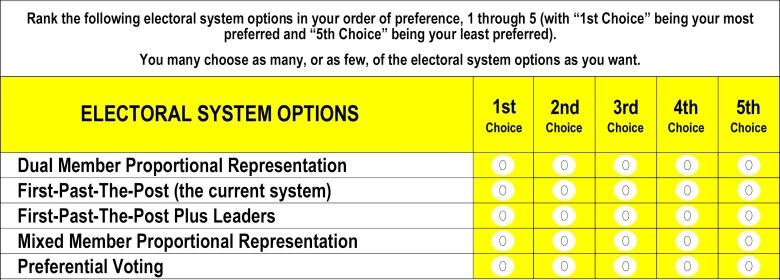Meet 'the tabulator': Able to count 300 paper ballots a minute
'If we had to count all those ballots manually I think we'd be there for months'

When the official vote count begins for the P.E.I. plebiscite, it will be a computer that tallies up the votes and declares the winner.
This is P.E.I.'s first foray into electronic voting and the first time those votes will be counted and processed by a computer, instead of by people.
"If we had to count all those ballots manually I think we'd be there for months," said Harry Neufeld, who's co-ordinating the audit team for the plebiscite.
He's the former chief electoral officer of British Columbia and has been involved in several electoral reviews in other provinces.

When voting ends on Saturday, Nov. 5 at 8 pm, the ballot boxes will be collected from across the Island and taken to Elections P.E.I. office where they'll be secured overnight.
On Sunday, the counting will begin.
Scanning 300 ballots a minute

Stacks of ballots will be fed into an electronic tabulator, similar to a photocopy machine.
"Every ballot that runs through, at 300 a minute, it's creating an image," said Glenn Foote of Election Systems and Software Canada (ES&S).
He'll be feeding the ballots into the machine.
The tabulator is set up to identify ballots that are missing key information, like the district number, or ones that aren't filled out properly.

For example, if someone picks just one option as all five choices — Or if someone picks just one option, and ranks it as their third choice — or if someone leaves their ballot blank.
A human being has to decide, is this going to count- Harry Neufeld, coordinator of audit team for P.E.I. plebiscite
All those ballots will automatically go into a separate bin for a team of adjudicators to examine.
"That's the kind of thing there has to be some kind of intervention and a human being has to decide, is this going to count," said Neufeld.
Paper ballot results converted to digital file
When all the paper ballots are in, they'll be converted into an digital file that will be shared with Simply Voting Inc, the company that is managing the electronic voting.
As the paper ballots are processed, the e-voting will continue, until Monday, Nov. 7 at 7 pm.
Practice runs
Elections P.E.I., Simply Voting Inc. and ES&S have held practice runs to test how the system works and so far they're pleased with the results.
"Our testing so far is encouraging," said Neufeld.
People should have a nice speedy experience - Brian Lack, Simply Voting Inc.
"I personally think voting by the internet option is probably the simplest, because it is, in our testing, certainly the fastest and it simply doesn't allow you to make any mistakes that you could on a paper ballot."
The online voting system will be open for 10 days and is able to handle up to 58,000 votes in just half an hour.
"That's not going to happen!" said Brian Lack of Simply Voting Inc. with a laugh. "At least I don't think so."
"People should have a nice speedy experience, a good experience, whether they're voting on line or by telephone" he said.

The online system is also set up to prevent people trying to vote more than once.
One vote per person
"Even if you have a thousand virtual computers on the cloud fired up and you log in with your PIN and date of birth on all 1,000 and you submit your vote on all 1,000 at the same microsecond, we guarantee only one vote gets through and you'll get 999 messages saying you've already voted," said Lack.
When all the voting is done, Simply Voting will merge the three separate files — internet, phone and paper ballots — and determine which option Islanders prefer.

"There are a number of steps to make sure that is completely smooth and that any anomalies are reported and approved by the chief electoral officer before the count begins," said Neufeld. "It's the manual steps involving humans that are going to take the time."
"It sounds complicated but it's not really that complicated. When everything's working it's a pretty simple process," said Glenn Foote, who's handled electronic voting in various elections for the past 17 years.
Once the merger is done, determining a winner is "almost instantaneous," said Neufeld.
Computer will go through ranked options
The computer will determine what option is the top choice of Islanders.
That could be clear by looking at the first choice of voters, or the computer may need to go through the second, third, fourth or even the fifth choices, to determine which option garnered 50 per cent plus one, or the highest number of votes.
If all goes well with the count, Gary McLeod said he'll deliver the results to the Speaker of the Legislature about an hour after the polls close on Nov. 7, and he hopes to make them public by about 9 p.m.
Then it will be up to the government to decide what to do with the result.
- MORE P.E.I. NEWS | A look inside the gates of the former Strait Crossing fabrication yard
- MORE P.E.I. NEWS | Miscommunication delayed byelection result, says Elections P.E.I.

